To help parents/child caregivers promote healthy newborn development,
we post a series of common questions with answers based on reliable resources.
NEWBORN
The “newborn” stage is birth – 2 months. During this period of time, you will witness many changes that seem to occur at a very rapid rate.
From the point of view of healthy child development, your baby is learning:
TRUST: discovering that they will get the dependable and loving care that they need
ATTACHMENT: developing a close emotional bond and relationship
If you are curious about usual developmental milestones, read this resource: Healthy Parents Healthy Children
This resource will help you to learn more about the physical developments, such as when does a baby lift up their head while on their tummy.
As well as physical development, parents are always looking at social development. It is exciting when your baby smiles and recognizes familiar voices.
You will see emotional development when your baby begins to quiet when comforted.
Yes, cognitive development occurs (thinking and communicating). A baby begins to make sounds and to follow things with their eyes.
For other sources of information, visit our Resources page.
Our Baby is here. Now what?
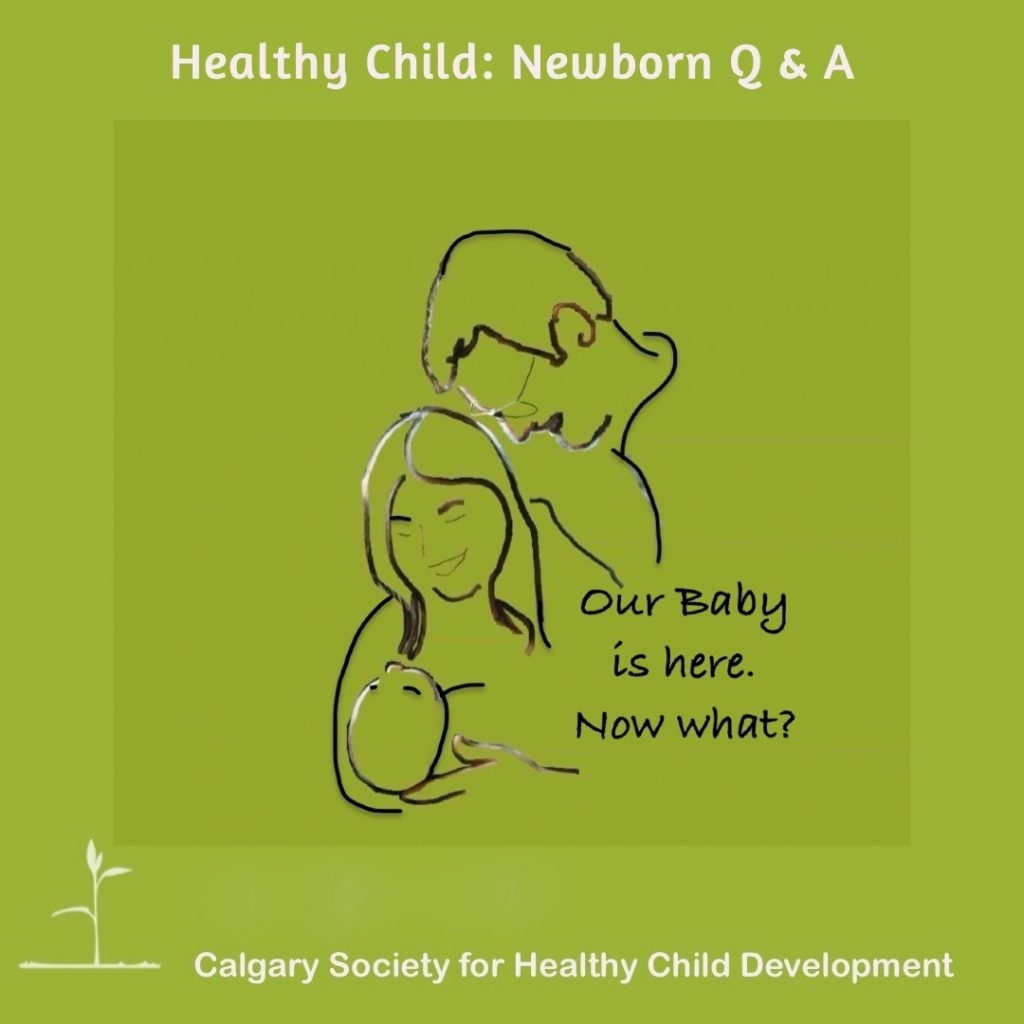
Whether your child was born at home, in hospital or a birthing centre, the early days can feel both exciting and overwhelming. You likely have some knowledge from prenatal classes or babysitting or being an older sibling.
Some things to remember:
* Take a deep breath; you can do this one step at a time. The first days may feel like an endless cycle of feeding, diapering, cuddling and sleeping (for the baby – and hopefully you get some sleep too.)
* Watch your baby for cues; babies might cry or fuss because they are hungry or uncomfortable, too cold/hot, need a diaper change or to burp. You will learn by trying different things. Sometimes a baby wants to be soothed — you will not spoil them by holding, cuddling and providing this comfort.
* Remember to take care of yourself: eat, drink fluids and rest when you can.
Everyone wants to come. How do we manage visitors?
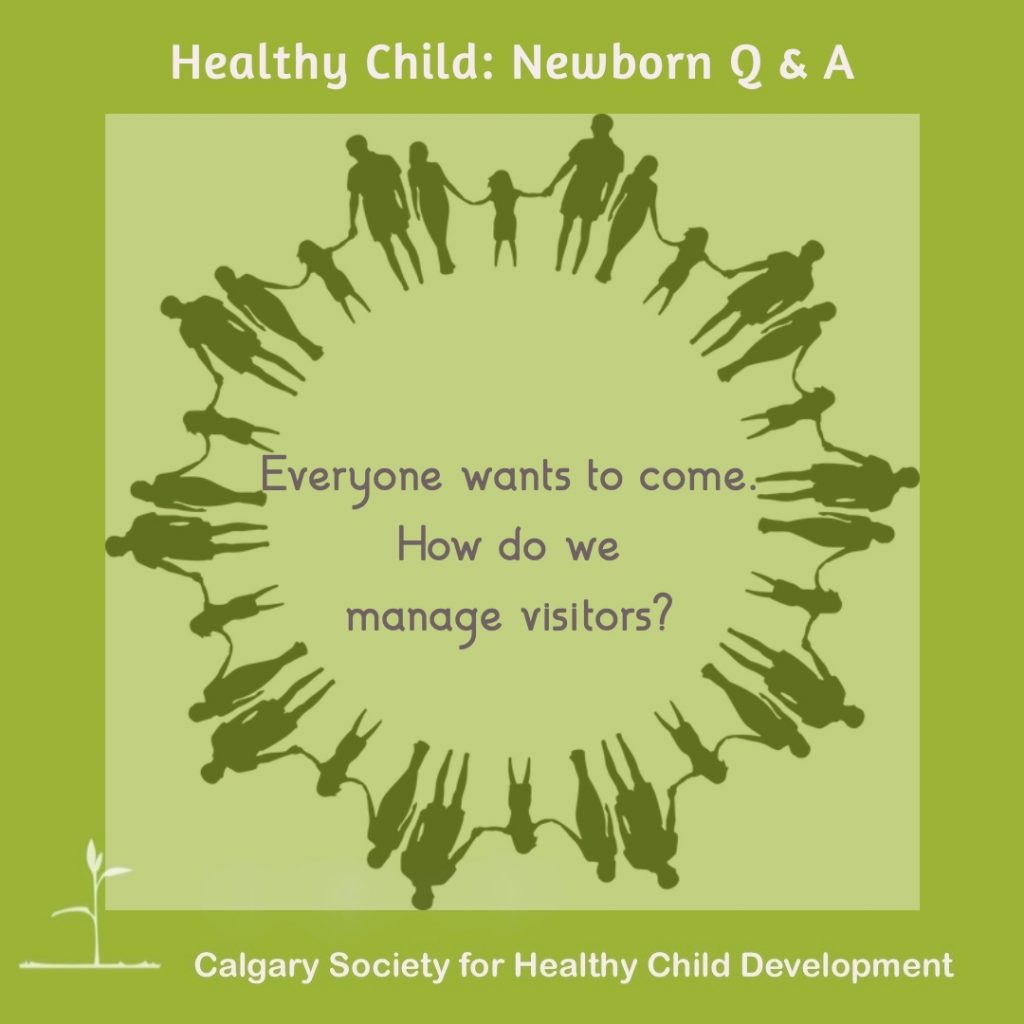
The answer will depend on you and your personal situation. Best to talk about this together and then share your decision with family/friends before the baby’s birth.
Points to consider:
* Newborn’s sleep/wake pattern takes time to develop. You may want to limit interruptions to this in the early days.
* Parents also need to rest and might not want to be disturbed by calls/visits.
* With technology, it easier today to “share” the baby experience.
* It is reasonable to set boundaries to manage your concerns about the risks of infection. For example, limit the number of visitors to immediate family. Ask people to wash their hands before touching your baby.
* If family members are going to help with baby care, it is a good idea for them to have their vaccines up to date.
SWADDLING
Why should we swaddle our baby?
How should we swaddle our baby?

Swaddling is a term that refers to a traditional method of wrapping a newborn snugly in a blanket. In fact, there are some benefits to swaddling during the first 2 months of life. However, you do not need to use this technique if you are not comfortable doing so. Some babies don’t like it. As you get to know your newborn, you will notice if swaddling seems to provide comfort or distress.
Possible benefits:
* baby feels warm and snug.
* stops a reflex called the Moro reflex or startle reflex — which occurs in response to a loud noise or sudden bright light. The baby will thrust out their arms, hands and legs and may cry.
* some babies are soothed and sleep better.
HOW TO SWADDLE
Wrap your baby snugly enough that the blanket does not come lose without being too constricting. You want to use a light blanket so your baby does not get too hot. Stop swaddling at 2 months of age or earlier if you baby can roll over.
View the video from VeryWellfamily
How to swaddle a baby
How can we promote healthy emotional development of our baby?
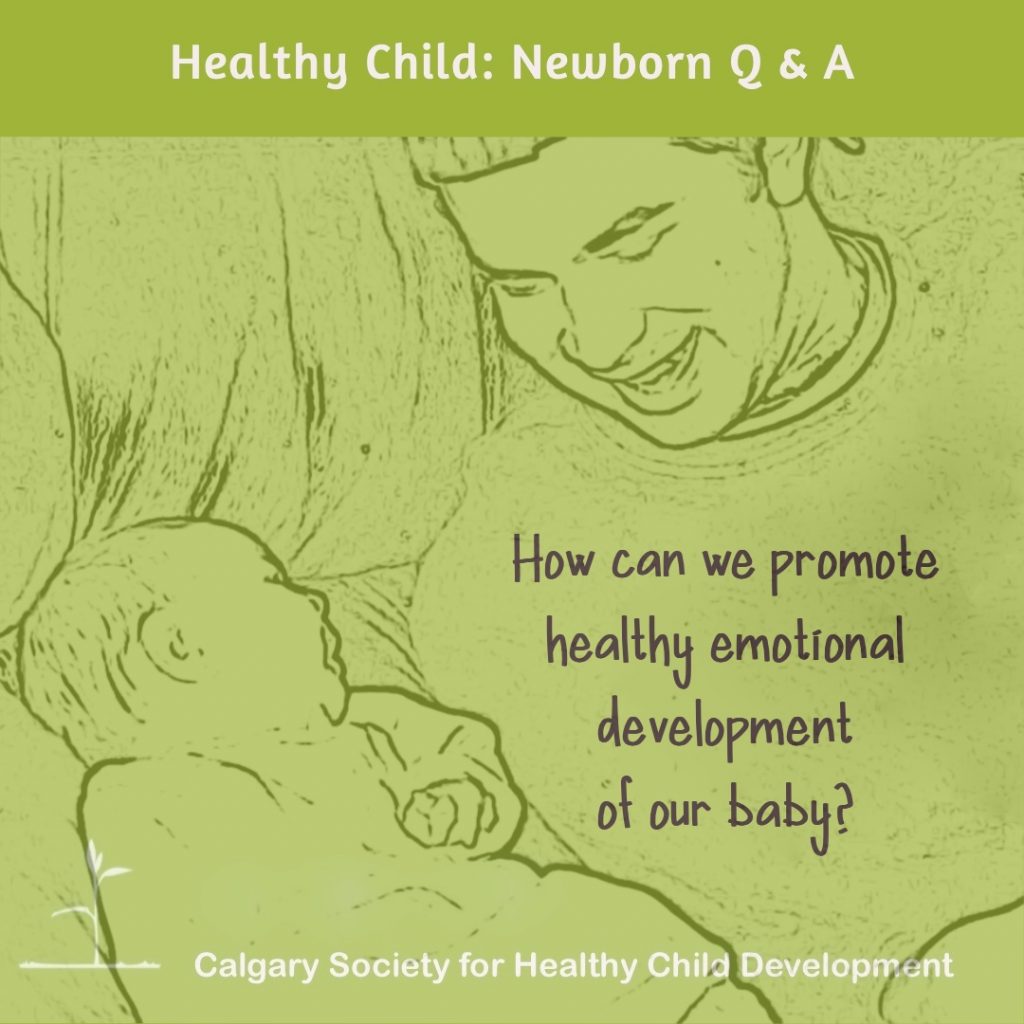
Of course, all the physical care is very important. When you meet your baby’s needs, your baby is learning to trust.
The relationship that you have with your newborn begins immediately. It is the foundation for healthy emotional development.
Interacting with your baby helps them to develop attachment. Talk, Sing. Smile. Your baby is watching and listening and learning.
During the newborn period you are getting to know your baby.
How does your baby react to different situations? What can you do to make your baby feel safe and secure?
Your baby is learning and so are you.
Read more in our article: Nurturing a Child’s Development
Can we “spoil” our newborn by too much attention?
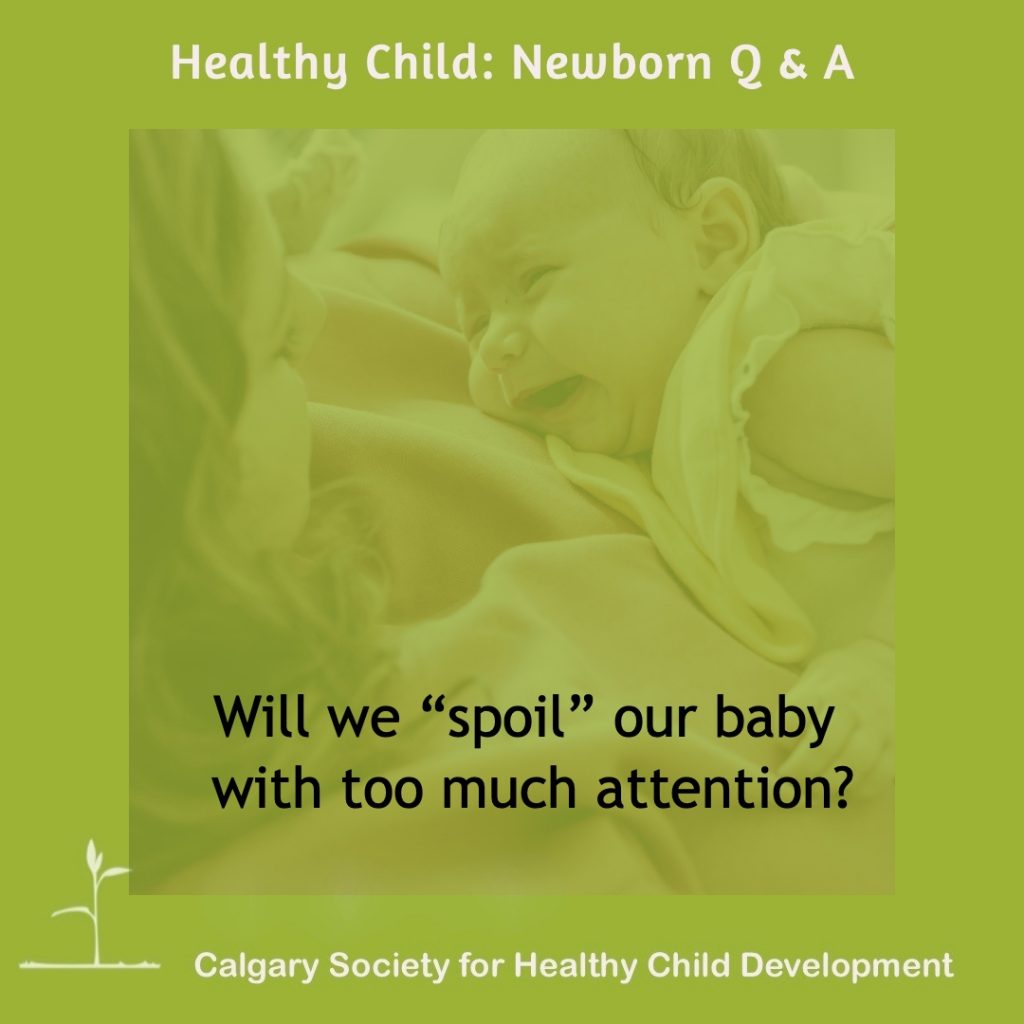
You may hear friends and family say that you can “spoil” your baby by too much attention. Some will tell you to let a baby “cry it out” or you will spoil them. Others will advise that a newborn baby cannot meet their own needs. When they cry, they are trying to tell you that they need you. When you respond, they feel safe and secure.
We agree with many experts that you do not spoil your baby by meeting their needs: physical needs for food or diaper change; emotional needs for comfort and reassurance. Some babies require more comforting than others. You will learn what your baby needs. And it will change during the first months of life. As babies develop, they learn to comfort themselves.
When Will Our Baby Smile?
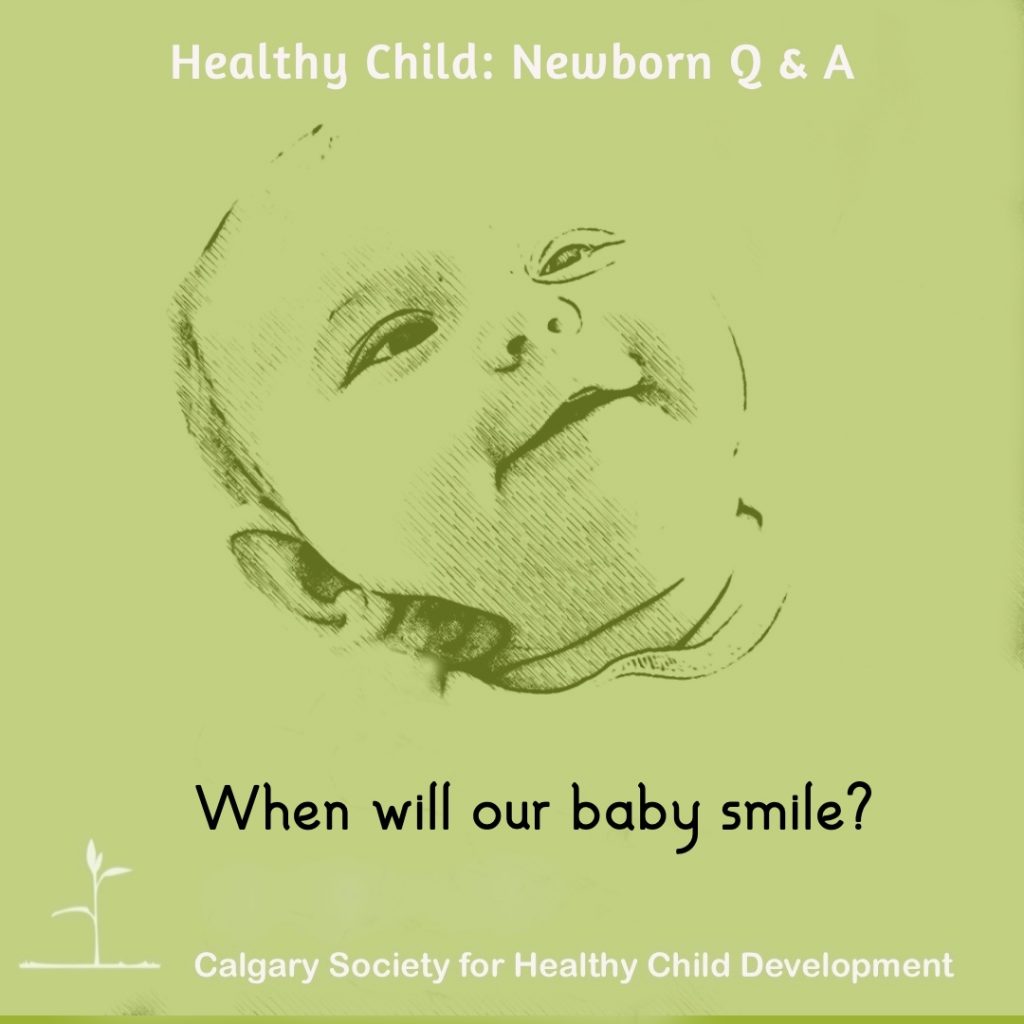
Most parents eagerly await the first smile — the moment when you feel that your baby sees and recognizes you! So, many will ask, “When does this happen?”
First, parents can know that at birth, newborns are able to interact: they send signals by fussing or crying and they respond by quieting when you meet their needs.
At this time, they can see and hear you. Before babies might have a “social smile”, they smile as a reflex: falling asleep, feeling comfortable, passing gas and yes, even peeing. However, you might see a “social smile” as early as 4 weeks of age. Indeed, you are very likely to see this by 2 months.
Visit our website Resources page and learn more about common milestones for newborns from Healthy Parents Healthy Children.
